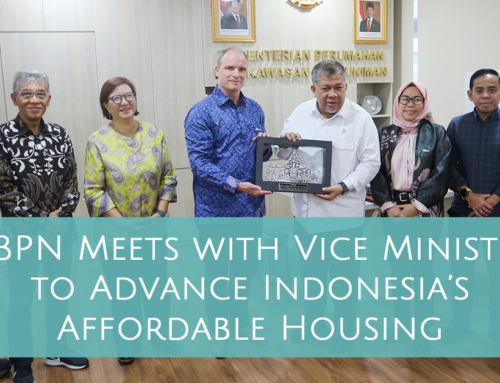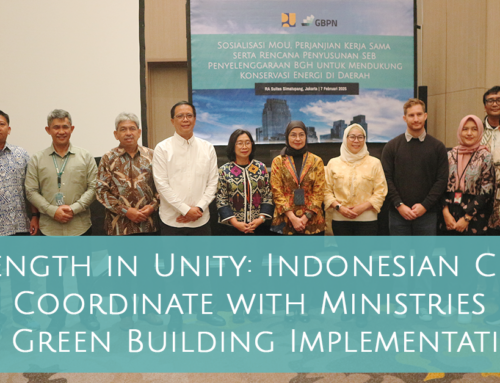GBPN has delivered a series of four capacity building sessions as part of a collaboration between The Ministry of Finance’s (MoF) Fiscal Policy Agency (FPA), together with Monash University Indonesia.
The sessions focused on developing fundamental knowledge about green building and financing schemes to incentivise green buildings uptake. They were geared towards FPA staff, the National Designated Authority (NDA) for Green Climate Fund (GCF secretariat) within the FPA, and other targeted stakeholders.
Capacity building is an integral part of the research component of the project with MoF. It aims to facilitate the market uptake of sustainable buildings in Indonesia as part of the government’s decarbonization strategy towards achieving its net zero emission target by 2060 or earlier by supporting understanding of the challenges and opportunities.
The overarching goal of the project is to help the FPA in identifying the fiscal and non-financial incentives options as well as financing mechanism schemes to unlock financing opportunities from various sources for sustainable buildings.
 According to Sandra Pranoto, GBPN’s Senior Advisor for Indonesia, equipping the stakeholders with the right set of skills and knowledge is an essential first step.
According to Sandra Pranoto, GBPN’s Senior Advisor for Indonesia, equipping the stakeholders with the right set of skills and knowledge is an essential first step.
“Better understanding of the underlying principles of sustainable buildings and the role of incentives in fostering their development, is instrumental in increasing the financial policy makers’ capacity to take the recommendations into consideration in formulating their next fiscal policy”, Ms Pranoto said.
“This is an important first step in identifying, supporting and empowering our champions in this process.”
Professor Andrew MacIntyre, President of Monash University Indonesia believes that the capacity building will provide the stakeholders with necessary knowledge on best practices of sustainable buildings.
“We believe that these deep dive knowledge series could help inspire and equip the participants with international best practice information to help the development of sustainable buildings in Indonesia” Mr. MacIntyre said.
Crafting a workable capacity building program for diverse participants
The capacity building was divided into four sessions with different topics to cater for a range of participants. These included:
- Introduction to green buildings,
- Investment opportunities and best practices of financing and incentive for green buildings
- Incentive for green buildings development
- Financing schemes for sustainable buildings.
Participants came from MoF, other technical ministries such as the Financial Supervisory Agency in charge of sustainable finance, Ministry of Environmental Affairs in charge of the NDC planning and implementation, Ministry of National Development Planning in charge of mainstreaming green growth in policy, planning and investment frameworks, as well as other stakeholders including the infrastructure financing state owned company (PT SMI), and development partners such as Global Green Growth Institute and Kemitraan.

Picture 1: 1st Session of the training, 2022
Across different sessions, GBPN received highly positive feedback on the design, format, and execution of the training. According to one of the participants, the capacity building approach introduced by GBPN and Monash University Indonesia was valuable particularly because of how it seamlessly blended conceptual and practical issues within the training.
“The capacity building curriculum covered beyond theoretical and conceptual elements, such as discussing practical policy debate regarding various financing schemes and incentives for increasing uptake of green buildings in different countries”, one government participant said.
“I also appreciated how the training content is easy to understand for those who are new to the topic of sustainable buildings”.
Research and policy oriented capacity building is a key
GBPN focused on making the sessions as practical as possible and designed to incorporate the research topic so as to enable the FPA staff to gain a better understanding of the overall picture of the research. This way, the capacity building sessions would help empower the participants with the fundamental insights to actively participate in the stakeholders consultation process and provide meaningful feedback on the findings.
Ultimately, the alignment of the capacity building sessions and research component is expected to generate better ownership among the participants of the recommendations from the research.
During the closing of the deep dive series, the training materials on best practices on financing and incentives for sustainable buildings was appreciated for providing useful insights on the role of sub-national governments, as well as the private sector in improving the enabling environment for developing the sustainable buildings market in Indonesia.
Participants learned about innovative financing schemes for sustainable buildings implemented in other countries, but were also pleasantly surprised to learn that some sub-national governments in Indonesia have already adopted some innovative financing schemes. This has inspired the FPA to also look into potential ways to help strengthen the sub national governments institutional capacity to better manage these schemes to complement and further enrich the research recommendations.
Share This Story, Choose Your Platform!
Stay in touch with how we’re transforming the buildings sector
GBPN runs innovative building policy reform programs in key regions around the world that aim to tackle the climate emergency by decarbonising the buildings sector. Stay up to date with our newsletter.
Stay in touch with how we’re transforming the buildings sector
GBPN runs innovative building policy reform programs in key regions around the world that aim to tackle the climate emergency by decarbonising the buildings sector. Stay up to date with our newsletter.







